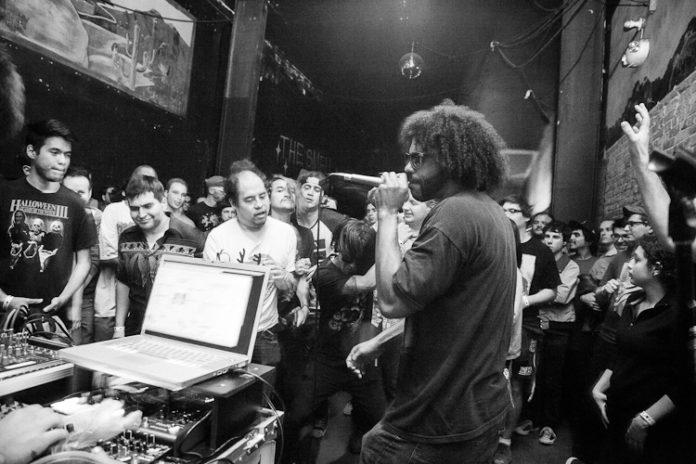Name one Asian American musician in a major scene or subgenre in American music.
This prompt on its own warrants some pushback against what my aim is in asking this:
- What would you consider a “major scene or subgenre”?
- What are you trying to exclude as a category in the American musical landscape, and why are you trying to exclude it?
- Why Asian American? Why not just say Asian?
- Who is the target segment of this prompt i.e. who cares?
One of the best concerts I’ve gone to, of which there have sadly only been a few, consisted of three left-field hip-hop groups: milo, clipping., and Busdriver. (You can tell they’re ahead of the pack when two of three groups stunt with lowercased aliases). Before my freshman year of college, I had bought the clipping. T-shirt and CD bundle off Sub Pop records’ website, finding out about the tour date listed at 7th Street Entry sometime later. It was also the first concert I had gone to by myself.
It was a sweaty ass night. At least, it was a sweaty ass night for me. I was wearing my black clipping. tee, featuring an unfurled strip of fence that was a motif in clipping.’s then latest self-titled record. I had spent the opener tuning my inhibitions out and firing up a state of purposeful mindlessness. That night, I was ready to burst open thousands of times to beats and flows that ranged from spaced-out to methodical yet transgressive. The whole of my physicality would be gulped up in the maniacal laughter of sound and fury.
And it was. I kept my eyes shut and my body open – to the possibilities of a senseless transcendence. You may have looked at me from the outside and thought, “This kid is possessed, and something with horns and mildewed scales was about to burst out of him”. I could tell just fine that the only thing ticking away inside me was a percussive joy.
Nothing could pull me down from my awesome perch. I was high as fuck. And then each song would crash to an end. The geyser of sound receded and, no longer engulfed in electricity, my eyes opened to the reality around me. Save the performers themselves, the place was white as fuck. Or, more to the point of this article, there was me, and maybe a Japanese dude sporting a DSLR and other token hipster ornaments, who made up the Asian segment at this alt-hip-hop shindig.
What kind of America would we live in if more Asian Americans went to these kinds of concerts, where the headliners were known for their excellence in sonic weirdness and ambition? And, on a broader note, what would it look like if more Asian Americans participated in creative industries that happen to be deeply rooted in American history and values?
Theater, both on-stage and on-screen, and music beyond the well-trodden centers of genres like pop, rock, and hip-hop are two industries that can be leveraged to boost the expressive visibility of any marginalized groups. For Asian Americans, this pathway provides a means of widening the possibilities for how Asian Americans are perceived and how they control the means through which they are perceived.
Yet the fertile ground space of American creative industries will not make room in its talent pool without certain growing pains. For the Asian American musician or performer operating in genres and categories where even one precedent for their creative labor is so far and few in between, convincing the many gatekeepers and potential consumers of the output of said labor can seem like a lost cause.
These creatives are up against not only the gatekeepers of these industries, as evidenced by the #OscarsSoWhite brouhaha of 2016 compounded by the head-slamming kid accountants incident, but also the thin overlap in audience segments. What current group of music listeners would be willing to give, say, a punk band fronted by an Asian American a shot? Would it matter whether the band turned up as a related Spotify artist or as part of a festival line-up? Would the ethos of said band irritate Asian communities who subscribe to values that would conventionally sneer at the principles and worldviews that such a genre sends to the foreground?
Did you come up with an answer to the question at the start of the piece yet? If you managed to, what are you doing to help bring your given musician, and other creatives like them, to a more visible and influential place in the public consciousness?
How you respond to these questions will reveal how far along we, as a recreationally advanced society, are towards appreciating and going buck wild to music, movies, and other media made by people beyond the black-white boundaries of American entertainment.
I’m not asking for an AsAm clipping., milo, Busdriver, or whatever musical outfit that represents hard-hitting yet subversive ideas in the scene. A few more Asian Americans who get it, dancing right along beside me, is all I want. The remainder of any such revolution starts with just that – a group who sees what could be, and chases after every beat until, finally, it just is.
